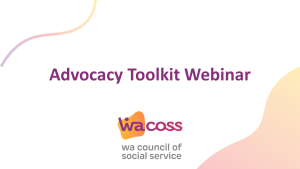The Western Australian Council of Social Service has welcomed the focus on Aboriginal communities and wellbeing in today’s State Budget, as well as keeping household bills manageable.
“Today’s Budget makes clear that the difficult decisions made by the McGowan Government to keep Western Australians safe during this pandemic have also cushioned our state’s economy from the impacts seen in the rest of the country and around the world,” said Dr Jennie Gray, Acting Chief Executive Officer, WACOSS.
“It is heartening to see the announced record investment in supporting WA’s Aboriginal communities. The State has stepped up following the Commonwealth abandoning their responsibilities in this space, and have committed to build and improve the infrastructure for those communities, while extending other programs like the Aboriginal Community Connectors.
“The number of police officers is set to be drastically increased. Rather than bringing more people into contact with the justice system, we need to invest in the services and community support that addresses the causes of crime and diverts people early.
“Providing the $600 electricity bill credit, while also freezing increases to tariffs and charges, will help put money in the pockets of low-income earners. This is a prudent decision to quickly stimulate spending in the local economy.
“We are pleased to see more than $7 million being spent to enable the new ‘shuttle conferencing’ model for contested family violence restraining order applications, which will assist in improving outcomes for women and children affected by family violence.
“Providing access to low cost and, in some cases, free training through the TAFE system is good to see. Linking it to areas like the NDIS and the McGowan Government’s signature METRONET infrastructure pipeline means we can be confident this training will lead to sustained employment opportunities.
“This Budget provides greater support for women than we saw from the Commonwealth earlier in the week, with investment in the skills and training of female dominated industries. The majority of the stimulus investment in job creation and infrastructure, however, still targets male-heavy industries.
“The supplementation payments to assist not-for-profits to meet wage rises, announced in the Mid-Year Review, are welcome. We remained concerned that there has not been improved funding for the community services sector to meet rising need. With increasing unemployment and financial hardship predicted, it is crucial we are providing more support for those worst impacted.
“This sector has worked tirelessly during the pandemic, stretching themselves beyond their resources. These services need greater support to be able to intervene early to assist families before they become entangled in an ongoing cycle of hardship.
“The new investment into social housing is very welcome, but it simply does not meet the existing level of need in the community, let alone what we will see into the future. With the tightening rental market, more people will struggle to keep a roof over their head, particularly once the eviction moratorium ends and banks stop deferring mortgage payments.
“This Budget sets out a strong vision for building up Western Australia’s capacities and resilience to see us through this crisis and into the future. To truly be resilient though, we need to ensure we are building thriving and inclusive communities where nobody is left behind,” Dr Gray said.
Ends.
Download a PDF version of this media release.
Media contact: Laurene Coller, Communications Officer, [email protected], 0419 316 557



